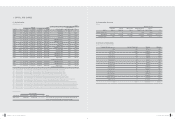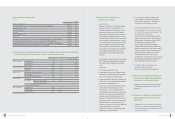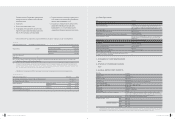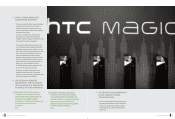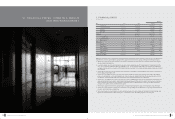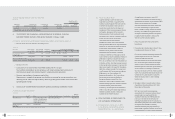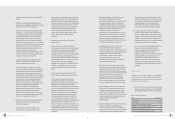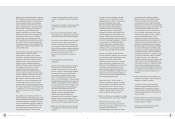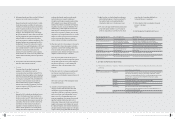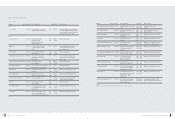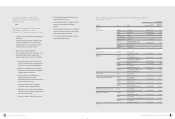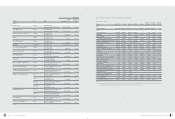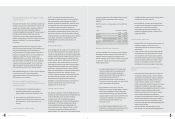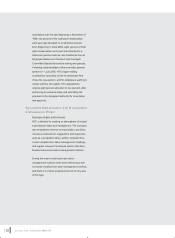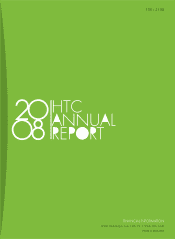HTC 2008 Annual Report Download - page 58
Download and view the complete annual report
Please find page 58 of the 2008 HTC annual report below. You can navigate through the pages in the report by either clicking on the pages listed below, or by using the keyword search tool below to find specific information within the annual report.
110 111
Working capital required to support the expansion
of HTC business operations has over recent years
been supplied exclusively from internal finances.
As the corporation has taken out no long-term
loans, fluctuations in interest rates have had no
effect on corporate debt. In terms of its finances,
HTC has held to a relatively prudent policy of
pursuing healthy growth. Asset allocation
decisions place priority on security and fluidity,
with most funds placed in time-mature NT dollar
denominated savings accounts. In 2008, the
average return on such accounts was 2.44%,
which was reflected in total interest income for the
year of NT$1.3 billion. A single percentage point
movement up or down in HTC's average earned
interest rate would cause interest earnings to rise
or fall by NT$0.6 billion.
HTC revenues are denominated primarily in US
dollars and euros. Production costs are
denominated in US dollars. Thus, significant
fluctuations in international exchange rates may
impact upon sales made in foreign currencies,
operational costs and net operating income. In
addition to strictly managing the quality and
timeliness of foreign currency invoice payments,
HTC engages in long-term forex contract
arrangements to minimize its exposure to
currency exchange risk. Financial derivatives
related to currency exchange risk held by HTC at
the close of 2008 were valued at USD 37 million,
EUR 141 million, GBP 3.87 million, JPY 1.60
billion, AUD 17 million and CAD 760 thousand.
Fluctuations in currency exchange rates set off
complementary movements in the fair value of
related derivatives. If the quoted exchange rate of
one of the abovementioned currencies were to fall
1% against the NT dollar, the benefit to HTC of its
derivative holdings would be close to NT$89
million.
During 2008, the value of the euro fell from an
initial NT$48:EUR1 to NT$41:EUR1 before ending
the year at NT$46:EUR1. During the same period,
the US dollar strengthened against the NT dollar,
rising from NT$30:USD1 at the start of 2008 and
ending the year at around NT$32.86:USD1. Net
income from foreign exchange during the year
totaled NT$146.682 million. Through careful
management, the potential risk posed by foreign
currency exchange has remained under effective
control .
The general rate of inflation in Taiwan during 2008
was 3.6% had an insignificant impact on HTC
profits.
2. Risks associated with high-risk/high-leveraged
investment; lending, endorsements, guarantees for
other parties and financial derivative transactions:
HTC does not make in high-risk, highly leveraged
investments, loans to others, endorsements, or
guarantees. All financial derivatives transactions
are conducted to avoid exchange-rate fluctuation
risks for foreign-currency denominated assets and
liabilities, and conducted in accordance with the
policies and measures adopted in HTC's
Procedures for the Acquisition or Disposal of
Assets.
3. Future R&D plans and anticipated R&D
expenditures:
Research and development efforts conducted by
the corporation in recent years have focused
primarily on user interfaces and mobile Internet
products as well as on developing the capabilities
necessary to deliver technical and after sales
service support to relevant products. Recent
results of HTC R&D efforts include the 2008
launch of HTC Touch Diamond - a 3G smart phone
incorporating the world's first 3D touch screen user
interface, and the September launch of T-Mobile
G1 - the world's first smart phone designed on the
Android operating system, developed jointly by
HTC, Google and T-Mobile USA. HTC will
continue to focus on developing smart phones
operating on Windows Mobile and Android
platforms and continue introducing new,
conceptually innovative generations of products
that meet customer needs and desires. HTC
anticipates investing 6%~7% of earnings in R&D in
order to sustain its competitive edge in this area.
4. Effects of domestic / foreign government policies
and regulations on HTC finances, and response
measures:
In response to recent changes in accounting
regulations, as of 1 January 2008, HTC has
adopted Interpretation 96-052 -
"
Accounting for
Bonuses to Employees, Directors and
Supervisors
"
issued in March 2007 by the
Accounting Research and Development
Foundation with respect to recognizing as
compensation expenses bonuses paid to
employees and remuneration to directors and
supervisors rather than as appropriations from
earnings. Ahead of government requirements,
HTC has also implemented revisions to Statement
of Financial Accounting Standards No. 10 related
to how accounts are managed with regard to
inventory. Note 4 to the financial statements
provides a detailed description of the reasons
underlying recent accounting practice changes
and their impact upon 2008 financial reporting.
Based on current plans, the government will
amend the Statute for Upgrading, which will expire
at the end of 2009. HTC currently enjoys benefit
primarily in terms of tax credits for R&D
investment and a five-year tax break. Once tax
breaks come to term, any assessment of the
impact of such on profitability will need to take into
consideration how relevant laws have been
revised. Also, with regard to the five-year tax
break, approved applicants may apply and receive
benefits even prior to formal implementation of
incentive measures and still enjoy benefits for the
entire designated five-year period.
Apart from the above, there have been no
changes in domestic or foreign laws or policies
that have affected in any significant manner the
financial situation of HTC. Attention remains
focused on relevant developments, and HTC is
prepared to develop response measures that
protect and advance its business needs.
5. Effects on HTC finances of changes in technology
and the business sector, and response measures:
Wireless telecommunications is today a
mainstream trend in the development of the IT
industry and technologies. Smart phones are now
the keystone product in wireless
telecommunications. With demand for wireless
Internet taking off and platforms gradually
ratcheting up to 3.5G, HTC adjusts its product
R&D work and alters its business to reflect
changing trends. Such can only further benefit
development and refinement of core technologies
and products at HTC. Concurrent efforts are made
to join with international telecommunications
service providers to introduce new products in
order to maximize HTC's position in the global
wireless telecommunications sector and deliver
excellent opportunities for growth. Active
management of the HTC brand has already
reduced significantly the distance between the
corporation and its markets and customers. HTC
will continue to leverage assets and resources
effectively to secure new technologies and R&D
results while instilling higher standards of quality
for its products in order to realize a full range of
competitive advantages. HTC has maintained a
consistently strong handle on evolutionary change
in all of its core technology. Apart from regularly
launching new touch screen mobile phone
models, the corporation was the first maker in the
world to launch an Android-based mobile phone
and the first ever to launch a GSM/Wimax mobile
phone. HTC will continue to develop products
incorporating the latest application technologies to
both satisfy and stimulate market demand as well
as earn the trust and respect of partners and
investors.
6. Effect on the company's crisis management of
changes in the company's corporate image, and
measures to be taken in response:
HTC strives to maintain a high standard of
professional ethics and business operations
management. HTC is governed by a code of
corporate integrity and ethical standards and its
management team tolerates no unethical acts or
lapses in integrity.
7. Expected benefits and possible risks associated
with any merger and acquisitions, and mitigation
measures being or to be taken:
HTC has no new acquisition plans as of the
printing date of this annual report.
2OO 8 HTC AN N UAL REPO RT
VI. FIN AN CIAL STATUS, O PERATIN G RESULTS AN D RISK MAN AGEM EN T
'0 8A R_ HT C/ 英文版* NEW 05/ 21/ 20 09 11: 02 頁面 11 0



